‘China is very powerful, with a clear vision. But it’s a secret state’ – Ai Weiwei

The Chinese artist and activist Ai Weiwei (1957, Beijing) is one of the most influential and creative names in contemporary art.
In 2020 he was elected as the most famous artist by the international journal The Art Newspaper.
His father, Ai Quing (1910-1996) – writer and well-known poet – was in the 60s the object of purges against intellectuals and artists, that Mao declared counter-revolutionaries and enemies of the Communist Party during the Cultural Revolution.

Weiwei grew up in the far north-west of China, where he lived under harsh conditions, due to his father’s exile to a work camp in the Gobi desert. ‘The farthest place you can find on the map of China’, as he describes it himself.
Upon Mao’s death in 1976 the family returned to Beijing.

As an activist, he openly criticizes the Chinese government’s stance on democracy and human rights.
He was arrested several times and detained in 2011 for 81 days without charge and had his passport confiscated.

After being allowed to leave China in 2015, he subsequently lived in Berlin, Cambridge (UK), and since this year in Portugal.
In Montemor-o-Novo to be precise, in the Alentejo province.

This year he opened his first solo exhibition in Portugal.
Rapture (meaning ecstasy but also abduction) – with 85 pieces his biggest ever – reveals work from the different phases in his life.

For example, photographs taken during the 80’s – when he still lived as an unknown artist in New York. A serpent made of backpacks, symbolizing the more than 5000 children killed in the 2008 earthquake in the Chinese province of Sichuan.

A set of boxes with three-dimensional scenes from the days the artist spent in prison in 2011 and his video film Coronation, about the start of the coronavirus pandemic in the city of Wuhan.

But also works created last year in Portugal with local craftsmen and materials. Such as Pendente, a 10-ton marble toilet paper roll – produced at B Stone – which the artist sees as a symbol of a world struggling to free itself from the pandemic.

Odisseia – the massive tile panel made at the Viúva Lamengo factory – representing the odyssey of refugees around the world and last but not least a statue of the artist himself – brainless and sitting on a chair to which he is handcuffed – made of cork in collaboration with the Corticeira Amorim company.

On the occasion of the 100th anniversary of the Chinese Communist Party (CCP), Weiwei declared that “The one-party system controls the army and the police, there is no freedom of expression and no independent judicial system. The CCP will rule China for a long time, even beyond our imagination.”
Rapture is to be seen until the 28th of November in the Cordoaria Nacional in Lisbon.
Stay healthy Fique saudável (pic Lusolobo)

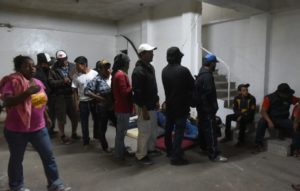 The ruling socialist party wants the government to speed up the
The ruling socialist party wants the government to speed up the 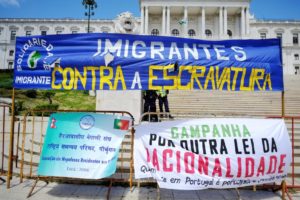 The reason for the amendment was the large-scale demonstration in May, when immigrants gathered before Parliament, expressing that they were treated like second-rank citizens, even though they paid tax and social insurance.
The reason for the amendment was the large-scale demonstration in May, when immigrants gathered before Parliament, expressing that they were treated like second-rank citizens, even though they paid tax and social insurance.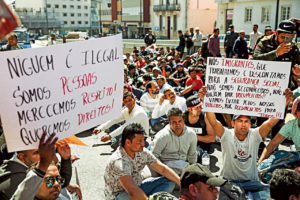 ‘The law doesn’t promote the integration of immigrants, who work here for many years but are not treated as human beings’, says Timóteo Macedo, president of Solidaridade Imigrante (Solim). ‘Our Government argues, that we need more
‘The law doesn’t promote the integration of immigrants, who work here for many years but are not treated as human beings’, says Timóteo Macedo, president of Solidaridade Imigrante (Solim). ‘Our Government argues, that we need more  Both left and right wing parties in Parliament are concerned about racism in the police force and violation of human rights in prisons. The reason is a recently published report of the European Committee against Torture, stating that police violence in Portugal – in particular against African descendants – is the highest in Western Europe.
Both left and right wing parties in Parliament are concerned about racism in the police force and violation of human rights in prisons. The reason is a recently published report of the European Committee against Torture, stating that police violence in Portugal – in particular against African descendants – is the highest in Western Europe. The committee – that also visited the country in 2013 – emphasizes that the police violence at police stations has increased and that the situation in the overcrowded prisons of Caxias, Setubal, and Lisbon is ‘inhuman and degrading.’
The committee – that also visited the country in 2013 – emphasizes that the police violence at police stations has increased and that the situation in the overcrowded prisons of Caxias, Setubal, and Lisbon is ‘inhuman and degrading.’ Julia Kozma, lawyer and chairing the European delegation, points the finger towards the Ministry of Internal Affairs – responsible for the police and the security forces – and regrets its lack of ‘awareness’. The Ministry denies the accusations and declares that ‘all complaints about violent police conduct are investigated by the Internal General Inspectorate (IGAI) and immediately reported to the Public Prosecutor.’
Julia Kozma, lawyer and chairing the European delegation, points the finger towards the Ministry of Internal Affairs – responsible for the police and the security forces – and regrets its lack of ‘awareness’. The Ministry denies the accusations and declares that ‘all complaints about violent police conduct are investigated by the Internal General Inspectorate (IGAI) and immediately reported to the Public Prosecutor.’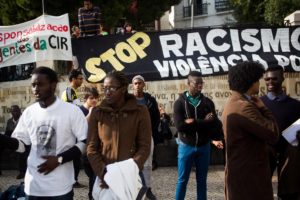 The reality, however, is that only a very small number of the complaints are brought before court. ‘And that’s exactly the problem’, says Kozma. ‘There is a spirit of impunity and bureaucracy, whereby complaining doesn’t help. The inspection body (IGAI) needs more skills to conduct criminal investigations and more resources to act independently.’
The reality, however, is that only a very small number of the complaints are brought before court. ‘And that’s exactly the problem’, says Kozma. ‘There is a spirit of impunity and bureaucracy, whereby complaining doesn’t help. The inspection body (IGAI) needs more skills to conduct criminal investigations and more resources to act independently.’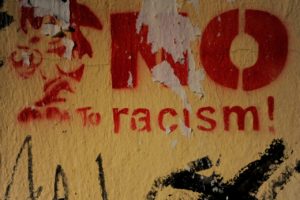 In recent months the non-governmental organization SOS racism received an increasing number of grievances from inmates in the prison of Lisbon about racist provocations and intimidations. Peculiar was that all complaints came from African immigrants and that any registration on xenophobe or racist behavior from the guards and staff is lacking.
In recent months the non-governmental organization SOS racism received an increasing number of grievances from inmates in the prison of Lisbon about racist provocations and intimidations. Peculiar was that all complaints came from African immigrants and that any registration on xenophobe or racist behavior from the guards and staff is lacking.